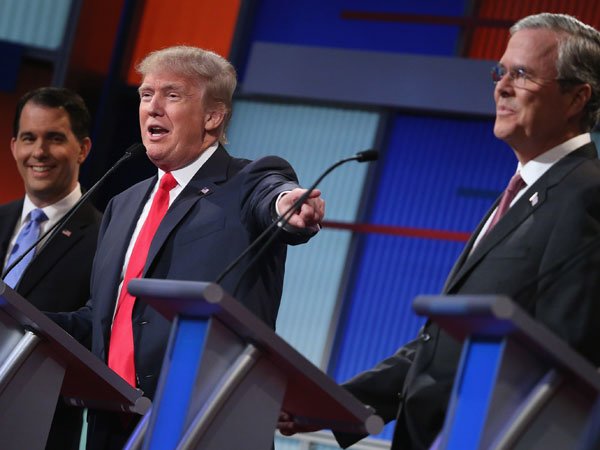
What is a debate, anyway?
I looked online for a definition of “debate.”
I liked this one:
A formal discussion on a particular topic in a public meeting or legislative assembly, in which opposing arguments are put forward.
This definition contains the key, essential feature of a debate that was missing in the Republican presidential forum televised last night: opposing arguments.
By that definition, it was not a debate. It was really a forum for the candidates, in which Fox News celebrities attempted to look witty and smart and catch the candidates in embarrassing or “gotcha” moments.
It’s demeaning to the office of the presidency once held by men like Thomas Jefferson, George Washington, James Madison or Abraham Lincoln.
There’s nothing in the nature of a free society, or even a semi-free society such as ours, to prevent a better format for screening presidential candidates. For some reason, we allow network news companies — geared more towards entertainment than serious philosophical debates about issues — to determine this format for us.
Networks are not to be blamed for doing what sells. However, the real question is: Why does this sell? And why does only this sell?
It’s impossible to speculate on who won this “debate,” because it was not actually a debate, since the key element — discussion of issues — was missing.
As for the candidates, aside from Donald Trump — nearly all of them were scripted, coached, restrained (in a bad way) and self-conscious. I don’t expect everyone to be great on television. That is not the point. But I do expect them to be themselves — or at least, to have a “self” to be, in the first place. The way to be yourself, when you’re a presidential candidate, is to have ideas, i.e. a philosophy, and a credible, tangible way of expressing how you would implement it. If you’re a socialist, for example, you will explain your idea that man is his brother’s keeper, owes his life to others, and here’s the latest government program for implementing that ideal. (Bernie Sanders does this quite well.) If you’re an advocate of capitalism, free markets and individual rights, you’d identify that philosophy, argue that man’s life is an end in itself, and explain (in today’s context) how to deregulate, “unsubsidize,” lower taxes, and all the rest.
None of the candidates appear to have an ideology. Their scripted sound bites, no doubt rehearsed in front of their handlers prior to the debate, fill the void where authentic ideas, convictions and attitudes otherwise might and should have been.
I know that in today’s world, not having an ideology is considered a good thing. But in reality, a president of the United States, of all things, without an ideology would be like operating an airplane without a radar system, or a ship (in times past) without a map. Or taking a long road trip without your GPS. It’s painful to watch.
Donald Trump lacks an ideology as much as anyone else on the stage. But what he does possess is a largely unencumbered sense of life. He expresses it as, “Let’s make America great again.”
His attitudes are shocking and controversial only in the brain-dead, milquetoast, horrifyingly uninteresting, unimportant tone of our times. Trump provides the emotional expression of what it might be like to express an ideology — if only you had one.
Based on his book, Trump does have more specific ideas than the format for the candidate forum / non-debate permitted. The same is undoubtedly true of the other candidates. There are so many candidates running for the Republican nomination that it’s difficult to give them all the time required. But that’s still no excuse for the lack of ideology and content we see in such events.
Discussions of who “won” these debates boil down to nonsubstantive nonessentials. Who looked the most comfortable? Who scored the most points? Who better overcame the “gotcha” attempt to nail someone down? Who looked the coolest? These are the kinds of things that got Obama nominated. Once in office, it became clear just how much substance he lacked. Yet nobody or nothing has yet emerged to fill the void.
People criticize Donald Trump for saying our present leaders are “stupid.” If you ask me, he lets them off easily. Doing things like raising the national debt to impossible-to-pay levels, raising taxes, crippling private enterprise with regulations and mandates like Obamacare, and literally surrendering to terrorist-sponsoring nations like Iran are, indeed, stupid things to do. But are these mistakes of honest ignorance, or a sinister self-loathing?
Americans have elected leaders (Obama, most glaringly) who are not merely stupid, but who really seem to hate America for what it once was. These are willful, knowing acts of self-defeat and self-destruction. America, on the whole, appears to suffer from something akin to a death wish. Donald Trump, who does not name or understand this fact, appears to react in the only way some know how: “If we’re going down, let’s at least go down fighting.”
It’s heartbreaking to think that America might go down. But Trump’s emotions — crude as they sometimes are — express the last vestiges of self-esteem in a nation that has flagellated itself almost beyond repair. “If we do go down, let’s at least go down fighting.”
In the absence of rational, credible ideas and polices — grounded in a coherent philosophy of individual rights, economic freedom and capitalism — Trump’s emotional reaction seems to be the only thing going.
Be sure to “friend” Dr. Hurd on Facebook. Search under “Michael Hurd” (Rehoboth Beach DE). Get up-to-the-minute postings, recommended articles and links, and engage in back-and-forth discussion with Dr. Hurd on topics of interest. Also follow Dr. Hurd on Twitter at @MichaelJHurd1
